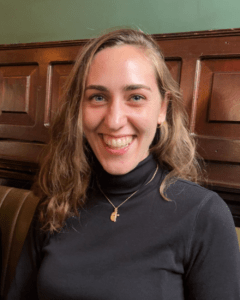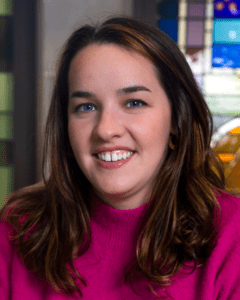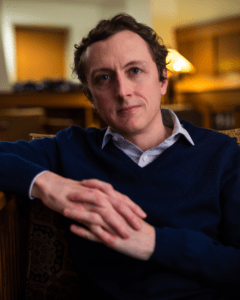
 Louisa Conwill (Advisor) is a PhD student in computer science and engineering at the University of Notre Dame. She studies how the designs of technologies encourage or discourage us from taking actions that lead to a good life, and how we can redesign technology to promote positive habits. Her research draws from virtue ethics and Catholic Social Teaching to determine the habits we should be designing for or avoiding. On this topic, she co-authored the book Virtue in Virtual Spaces: Catholic Social Teaching and Technology which was published by Liturgical Press in September 2024. A graduate of Brown University, Louisa worked as a software engineer for Amazon Alexa and served as a campus missionary with the Fellowship of Catholic University Students (FOCUS) before starting her graduate studies at Notre Dame.
Louisa Conwill (Advisor) is a PhD student in computer science and engineering at the University of Notre Dame. She studies how the designs of technologies encourage or discourage us from taking actions that lead to a good life, and how we can redesign technology to promote positive habits. Her research draws from virtue ethics and Catholic Social Teaching to determine the habits we should be designing for or avoiding. On this topic, she co-authored the book Virtue in Virtual Spaces: Catholic Social Teaching and Technology which was published by Liturgical Press in September 2024. A graduate of Brown University, Louisa worked as a software engineer for Amazon Alexa and served as a campus missionary with the Fellowship of Catholic University Students (FOCUS) before starting her graduate studies at Notre Dame.
 Megan Levis (Advisor) Ph.D. is an assistant professor of the practice with the University of Notre Dame’s Institute for Social Concerns and College of Engineering. She completed a postdoctoral fellowship with Notre Dame’s Technology Ethics Center and Department of Computer Science and Engineering. Dr. Levis has a Ph.D. in bioengineering from the University of Notre Dame. Her research interests relate to questions concerning how technology shapes the cultural understanding of what it means to be human, and how technology can be designed to encourage virtue and the common good. Dr. Levis recently co-authored a book on social technology and virtue called Virtue in Virtual Spaces.
Megan Levis (Advisor) Ph.D. is an assistant professor of the practice with the University of Notre Dame’s Institute for Social Concerns and College of Engineering. She completed a postdoctoral fellowship with Notre Dame’s Technology Ethics Center and Department of Computer Science and Engineering. Dr. Levis has a Ph.D. in bioengineering from the University of Notre Dame. Her research interests relate to questions concerning how technology shapes the cultural understanding of what it means to be human, and how technology can be designed to encourage virtue and the common good. Dr. Levis recently co-authored a book on social technology and virtue called Virtue in Virtual Spaces.
 Sara Lumbreras (Advisor) is a senior associate professor at the ICAI School of Engineering at Universidad Pontificia Comillas. She serves as the Deputy Director of Research Outcomes at the Institute of Research and Technology and co-leads the Center for Science, Technology, and Religion alongside Jaime Tatay. Sara has authored over seventy academic publications and has directed or participated in more than twenty projects with private companies and public institutions, including the European Commission, the Inter-American Development Bank, and a five-year tenure at JPMorgan in London.
Sara Lumbreras (Advisor) is a senior associate professor at the ICAI School of Engineering at Universidad Pontificia Comillas. She serves as the Deputy Director of Research Outcomes at the Institute of Research and Technology and co-leads the Center for Science, Technology, and Religion alongside Jaime Tatay. Sara has authored over seventy academic publications and has directed or participated in more than twenty projects with private companies and public institutions, including the European Commission, the Inter-American Development Bank, and a five-year tenure at JPMorgan in London.
Recognized as a Marshall Memorial Fellow, her research focuses on developing and applying mathematical optimization and artificial intelligence to complex decision-making problems. She specializes in decision-making under uncertainty, decomposition methods, and interpretable machine learning. Sara’s work spans the energy sector — particularly in network design — as well as health and finance. Additionally, she explores the philosophical implications of these technologies, including AI ethics and the impact of artificial intelligence on anthropology. She is also the author of the book “Respuestas al transhumanismo: cuerpo, autenticidad y sentido” (“Responses to Transhumanism: Body, Authenticity, and Meaning”). Through her involvement in interdisciplinary projects and commitment to integrating ethical principles into technological advancements, Sara Lumbreras contributes to both the technical and the ethical discourse surrounding technology.
 Walter J. Scheirer (Advisor) is the Dennis O. Doughty Collegiate Professor of Engineering at the University of Notre Dame. His primary technical research interest within computer science is artificial intelligence. He is a global AI leader, serving as the Chair of the IEEE Computer Society Technical Community on Pattern Analysis and Machine Intelligence and as a board member of the Computer Vision Foundation. Prof. Scheirer is also a cultural critic and historian, commenting on the social context of emerging technologies from the realistic perspective of a technologist, and promoting technology development informed by Catholic Social Teaching that upholds the common good. He is the author of the book A History of Fake Things on the Internet (Stanford University Press 2023) and co-author of the book Virtue in Virtual Spaces: Catholic Social Teaching and Technology (Liturgical Press 2024).
Walter J. Scheirer (Advisor) is the Dennis O. Doughty Collegiate Professor of Engineering at the University of Notre Dame. His primary technical research interest within computer science is artificial intelligence. He is a global AI leader, serving as the Chair of the IEEE Computer Society Technical Community on Pattern Analysis and Machine Intelligence and as a board member of the Computer Vision Foundation. Prof. Scheirer is also a cultural critic and historian, commenting on the social context of emerging technologies from the realistic perspective of a technologist, and promoting technology development informed by Catholic Social Teaching that upholds the common good. He is the author of the book A History of Fake Things on the Internet (Stanford University Press 2023) and co-author of the book Virtue in Virtual Spaces: Catholic Social Teaching and Technology (Liturgical Press 2024).
 Erin MacMurray van Liemt (Research Fellow) is a Senior Sociotechnical Researcher at Google Research based in Venice, CA. She has served as both a researcher and linguist at Google for nearly 10 years. Her current research is focused on building evidence-based community-informed datasets, namely culturally and linguistically diverse ontologies with the goal of improving how identities are represented across Google’s products. In 2020, Erin was a Google Fellow as part of the Trevor Project Fellowship for the award winning Crisis Contact Simulator, featured as the Time’s 100 Best Inventions of 2021. She later applied this work in a second Google.org Fellowship in partnership with Reflex AI in 2023, where she helped craft datasets to support peer-to-peer empathy conversation simulators for the Veteran community. Prior to Google Research, Erin has also worked on ontology design for Google’s Knowledge Graph and text/image classification on Ads Privacy and Safety teams.
Erin MacMurray van Liemt (Research Fellow) is a Senior Sociotechnical Researcher at Google Research based in Venice, CA. She has served as both a researcher and linguist at Google for nearly 10 years. Her current research is focused on building evidence-based community-informed datasets, namely culturally and linguistically diverse ontologies with the goal of improving how identities are represented across Google’s products. In 2020, Erin was a Google Fellow as part of the Trevor Project Fellowship for the award winning Crisis Contact Simulator, featured as the Time’s 100 Best Inventions of 2021. She later applied this work in a second Google.org Fellowship in partnership with Reflex AI in 2023, where she helped craft datasets to support peer-to-peer empathy conversation simulators for the Veteran community. Prior to Google Research, Erin has also worked on ontology design for Google’s Knowledge Graph and text/image classification on Ads Privacy and Safety teams.
Erin holds a PhD in Linguistics from the Unversité Sorbonne Nouvelle funded by an ANRT grant (National Association for Research and Technology in France: partnership between Temis and the Sorbonne Nouvelle) where her focus was on methods in Natural Language Processing and Quantitative Linguistics for information discovery and extraction.


